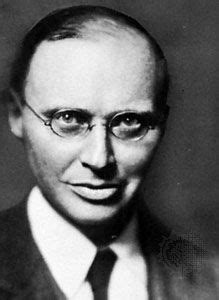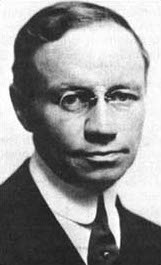A Quote by Clarence Day
Ants are good citizens; they place group interest first. But they carry it so far, they have few or no political rights. An ant doesn't have the vote, apparently; he just has his duties.
Related Quotes
We have the right to rid our houses of ants; but what we have no right to do is to forget to honor the ant as God made it, out in the place where God made the ant to be. When we meet the ant on the sidewalk, we step over him. He is a creature, like ourselves; not made in the image of God, it is true, but equal with man as far as creation is concerned. The ant and the man are both creatures.
I think the 'Terminator' idea is a reasonable one - that is that one day the Internet becomes self-aware and simply says that humans are in the way. After all, if you meet an ant hill and you're making a 10-lane super highway, you just pave over the ants. It's not that you don't like the ants, it's not that you hate ants; they are just in the way.
This is what metaphor is. It is not saying that an ant is an elephant. Perhaps; both are alive. No. Metaphor is saying the ant is an elephant. Now, logically speaking, I know there is a difference. If you put elephants and ants before me, I believe that every time I will correctly identify the elephant and the ant. So metaphor must come from a very different place than that of the logical, intelligent mind. It comes from a place that is very courageous, willing to step out of our preconceived ways of seeing things and open so large that it can see the oneness in an ant and in an elephant.
If army ants are wandering around and they get lost, they start to follow a simple rule:Just do what the ant in front of you does. The ants eventually end up in a circle. There's this famous example of one that was 1,200 feet long and lasted for two days; the ants just kept marching around and around in a circle until they died.
Now the good of political life is a great political good. It is not a secular good specified by a comprehensive doctrine like those of Kant or Mill. You could characterize this political good as the good of free and equal citizens recognizing the duty of civility to one another: the duty to give citizens public reasons for one's political actions.
It is alleged by men of loose principles , or defective views of the subject, that religion and morality are not necessary or important qualifications for political station. When a citizen gives his vote to a man of immorality , he abuses his civic responsibilty. He sacrifices not only his own interest but that of his neighbor, and he betrays the interest of his country.
When we speak of the origin of western democracy it's precisely here, in this territory that the modern definition of democracy first emerged in city/states known now as Greece. This was coming from a society in which 30 thousand citizens had rights and 300 thousand were slaves and citizens without rights that lived in this territory. So that was the concept of western democracy; some citizens had the prerogative of exerting their civil and political rights while the others had none.
Any group or "collective," large or small, is only a number of individuals. A group can have no rights other than the rights of its individual members. In a free society, the "rights" of any group are derived from the rights of its members through their voluntary individual choice and contractual agreement, and are merely the application of these individual rights to a specific undertaking... A group, as such, has no rights.
See that your chief study be about heart, that there God's image may be planted, and his interest advanced, and the interest of the world and flesh subdued, and the love of every sin cast out, and the love of holiness succeed; and that you content not yourselves with seeming to do good in outward acts, when you are bad yourselves, and strangers to the great internal duties. The first and great work of a Christian is about his heart.
































